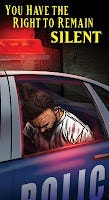Supreme Court to decide if a person can remain silent while being interviewed by police.

Texas - "The Supreme Court agreed on Friday to decide a major case on the right to remain silent — a case testing whether that right exists for an individual who has not been arrested but is interviewed by police, and was not given Miranda warnings, when that silence was used to help prove guilt at a trial. That case — Salinas v. Texas (docket 12-246) — was one of six new cases accepted for review." Here's a link (pdf) to the Texas Court of Criminal Appeals decision being challenged.
The Fifth Amendment to the United States Constitution states, “No person … shall be compelled in any criminal case to be a witness against himself.” The Court of Criminal Appeals acknowledged that, "The Supreme Court has held that a defendant’s Fifth Amendment right against compelled self-incrimination is violated if the State is allowed to impeach the defendant’s testimony by using his post-arrest, post-Miranda silence." But in Salinas they ruled that pre-arrest silence could be used for impeachment purposes.
So what does that really mean in practice? Essentially, said the CCA, prosecutors may argue in Texas courts that the act of remaining silent in the face of pre-arrest police questioning may "be admitted as substantive evidence of guilt."
While that stratagem would be disallowed in most of the country, "the Fourth, Eighth, and Eleventh Circuits, along with the States of Minnesota, Missouri, and Texas, have held that a defendant’s pre-arrest silence may be commented on by prosecutors and used as evidence of guilt at trial," according to a brief (pdf) filed with SCOTUS by the National Association of Criminal Defense Lawyers. NACDL cited SCOTUS' famous Miranda ruling, which included this example of how police might use a suspect's silence to improperly infer guilt. Imagine if a police officer said to the suspect:
Joe, you have a right to remain silent. That’s your privilege and I’m the last person in the world who’ll try to take it away from you. If that’s the way you want to leave this, O.K. But let me ask you this. Suppose you were in my shoes and I were in yours and you called me in to ask me about this and I told you, ‘I don’t want to answer any of your questions.’ You’d think I had something to hide, and you’d probably be right in thinking that. That’s exactly what I’ll have to think about you, and so will everybody else. So let’s sit here and talk this whole thing over.
That line of questioning was quoted directly from the creators of the "Reid technique" of police interrogation, a version of which is still widely employed today (see prior, related Grits posts). As SCOTUS declared back in 1962, “[f]ew will persist in their initial refusal to talk . . . if this monologue is employed correctly,” but the court disallowed the tactic because it placed the defendant in a position where exercising a constitutional right would be used at trial to infer guilt.
So why would pre-arrest silence be any different? The NACDL brief applies the same hypothetical conversation with "Joe" from 1962 to the situation presented in the Salinas case:
The rationale of the decision below would allow for an even higher level of coercion. Suppose the officer continues, “Joe, you don’t have to answer my questions, but if you don’t, then that’s going to be used as evidence that you’re guilty. The prosecutor is going to stand in front of that jury and tell them that an innocent man would answer my questions. So you don’t need to talk to your lawyer, you need to answer my questions right now.”
Many would find this police conduct shocking and abusive. But the officer in this example is doing nothing more than correctly stating the law of the three circuits and three states which hold that there is no Fifth Amendment right to remain silent prior to arrest and that prosecutors can use a suspect’s silence as substantive evidence of guilt at trial.
That seems to me quite a strong argument. After all, as the NACDL brief remarked, “if the Government imposes a penalty upon an individual’s silence, then no 'free choice' exists and the suspect is compelled, in violation of the Fifth Amendment, to be a witness against himself.”
http://gritsforbreakfast.blogspot.com/2013/01/scotus-to-review-texas-holding-that.html
http://www.activistpost.com/2013/01/what-you-dont-say-might-be-held-against.html#more


